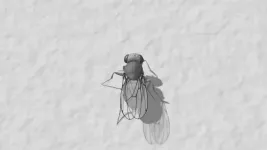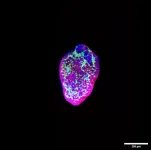(Press-News.org) Tap into any social media platform, turn on the television or cue up a podcast, and it is easy to find examples of hypocrisy or bad behavior in political discourse, and new research from University of Nebraska–Lincoln political scientists may explain why.
The findings from a large survey study, co-authored by Kyle Hull, Kevin Smith and Clarisse Warren, demonstrate the willingness of people to bend their morals — even behave unethically — when engaging in the political realm.
Results also suggest that hostility toward outgroups (i.e., opposing party) is the driving factor for the moral ambiguity exercised when respondents switch from the personal to the political arena.
And there is not just one guilty party.
“People, regardless of age or ideology, were more willing to engage in immoral behaviors and judgments if the behaviors were in the political realm,” said Hull, a visiting assistant professor in political science. “And a lot of it was just driven by genuine internal dislike of the ‘other’ side.”
The researchers developed a survey and engaged four different samples of adults, totaling 2,472 respondents. The survey included nonpolitical and political moral behavior scales and political and nonpolitical moral tolerance scales.
“Basically, we were taking the same person and asking them virtually the same questions,” said Smith, Leland J. and Dorothy H. Olson Professor of Political Science. “The only difference in the items is we changed ‘person’ to ‘politician.’ And that was enough to shift people’s moral judgment. It changes in a way that induces more flexibility in our moral assessments.”
That includes assessments of politicians’ bad behavior, as the co-authors found people are more morally tolerant of politicians they liked, similar to the behavior they were willing to tolerate from a friend.
In an increasingly polarized — and often toxic — political environment, the researchers said the results highlight the harm of outrage politics.
“I think there’s some reason for concern,” Hull said. “As long as there is some internalized dislike of the outgroup, there’s certainly a risk of behaviors that may be involved when people are willing to act less morally. Politics makes us do things that we just normally wouldn’t do and tolerate things we wouldn’t normally tolerate. It brings out, sometimes, the worst in us.
“The way some politicians and media speak about the other party fuels that fire in a way. The more we engage in pitting one party or the other as the bad guys, and the more you feel that way, the more you are willing to set your morals aside.”
The research builds on Smith’s work exploring how political engagement and ideology drive moral values and choices, not the other way around.
“If that’s true, then people will probably be using different standards for moral behavior or moral choices in their personal lives than they are in the political world,” Smith said. “And that’s what we found. It’s not like politics makes bastards of the left or the right, or the young or the old, or the rich or the poor. Politics seems to make bastards of us all.”
END
Why politics bring out the worst in us
Survey study shows people are more willing to bend their morals when they engage in the political realm
2024-02-08
ELSE PRESS RELEASES FROM THIS DATE:
How fruit flies control the brain's "steering wheel"
2024-02-08
When we walk down the street, we have an internal sense of which way we are heading, from looking at street signals and physical landmarks, and also a sense of where we’d like to go. But how does the brain coordinate between these directions, doing the mental math that tells us which way to turn?
Now, new research describes such a neural process in fruit flies, providing insight into how an animal’s brain steers it in the right direction. The study, published in Nature , shows how neurons that signal the direction in which a fly is currently oriented work together with neurons that signal the direction in which way the ...
SwRI’s Dr. Alan Stern named AIAA Fellow
2024-02-08
SAN ANTONIO — February 8, 2024 —Dr. Alan Stern, a planetary scientist and associate vice president of Southwest Research Institute’s Space Sector, has been named a Fellow of the American Institute of Aeronautics and Astronautics (AIAA). Fellows are recognized for their notable and valuable contributions to the arts, sciences or technology of aeronautics and astronautics. AIAA cited Stern “for outstanding contributions to the exploration of the solar system and the development of commercial spaceflight.”
“I am honored beyond words to be named an AIAA Fellow and thank my nominators very much, including SwRI Vice President Dr. Ben Thacker, who led the nomination,” ...
Visualising multiple sclerosis with a new MRI procedure
2024-02-08
Multiple sclerosis (MS) is a neurological disease that usually leads to permanent disabilities. It affects around 2.9 million people worldwide, and around 15,000 in Switzerland alone. One key feature of the disease is that it causes the patient’s own immune system to attack and destroy the myelin sheaths in the central nervous system. These protective sheaths insulate the nerve fibres, much like the plastic coating around a copper wire. Myelin sheaths ensure that electrical impulses travel quickly and efficiently from nerve cell to nerve cell. If they are damaged or become thinner, this can lead to irreversible visual, ...
Cacao of Excellence announces 2023 Cacao of Excellence gold, silver, and bronze award winners
2024-02-08
AMSTERDAM, NETHERLANDS (February 8, 2024) – Cacao of Excellence, a programme of the Alliance of Bioversity International and the International Center for Tropical Agriculture (CIAT) announced today the winners of the 2023 Cacao of Excellence Awards, honouring excellence in the cultivation of cacao, while also supporting and encouraging a more sustainable sector. The full list of Gold, Silver and Bronze winners can be found below and on the Cacao of Excellence website.
The winners were announced ...
How nearly identical RNA helicases drive “mRNA export” via distinct protein complex pathways
2024-02-08
Genetic expression, often leading to protein synthesis, requires a complex coordination of molecular machinery across several stages. A vital step in protein-coding gene expression is messenger RNA (mRNA) export, which involves shuttling mature mRNAs from the cell’s nucleus to the cytoplasm.
The mRNA export process relies on mRNA–protein complex formation, with the evolutionary conserved ATP-bound TREX complex playing a pivotal role. Among its components, the RNA helicase UAP56 is perhaps the most important one during its assembly. Not only does UAP56 participates during mRNA splicing in some transcripts, but it also recruits ...
Heart organoids simulate pregestational diabetes-induced congenital heart disease
2024-02-08
An advanced human heart organoid system can be used to model embryonic heart development under pregestational diabetes-like conditions, researchers report February 8 in the journal Stem Cell Reports. The organoids recapitulate hallmarks of pregestational diabetes-induced congenital heart disease found in mice and humans. The findings also showed that endoplasmic reticulum (ER) stress and lipid imbalance are critical factors contributing to these disorders, which could be ameliorated with exposure to omega-3s.
“The new stem cell-based organoid technology employed will enable physiologically relevant studies in humans, allowing us to bypass animal models and obtain more information ...
New study points to supply chain disruptions if the FDA removes ineffective decongestant from the market
2024-02-08
PITTSBURGH, Feb. 8, 2024 — In a new study of nasal decongestant purchasing patterns, researchers at the University of Pittsburgh School of Medicine found that phenylephrine remained the most popular choice year after year, despite decades of concerns over a lack of evidence supporting its effectiveness.
Published today in JAMA, the research letter points to a coming wave of supplychain disturbances if the Food and Drug Administration (FDA) moves to pull oral phenylephrine from the shelves, as recommended by an FDA advisory panel in 2023 that found the medication ineffective.
The researchers ...
Trends in phenylephrine and pseudoephedrine sales
2024-02-08
About The Study: Despite a lack of clinical efficacy evidence, phenylephrine was the most common oral decongestant in the U.S. from 2012-2021, with hundreds of millions of units purchased by retail pharmacies annually, and sales remained stable during this time. In contrast to pseudoephedrine, which is often formulated as a stand-alone product, most phenylephrine products were co-formulated with antihistamines or antitussives, which are likely to provide some symptom relief for cough and cold symptoms.
Authors: Timothy S. Anderson, M.D., M.A.S., of the University of Pittsburgh, is the corresponding author.
To access the embargoed study: Visit our For The Media website at ...
Visual impairment and real-world home physical activity with home environment in an older population
2024-02-08
About The Study: The results of this study demonstrated that home environment features, particularly lighting, may influence home activity metrics in older adults with visual impairment. Further prospective studies would be needed to confirm if home modifications can improve at-home activity.
Authors: Pradeep Y. Ramulu, M.D., M.H.S., Ph.D., of the Johns Hopkins University School of Medicine in Baltimore, is the corresponding author.
To access the embargoed study: Visit our For The Media website at this link https://media.jamanetwork.com/
(doi:10.1001/jamaophthalmol.2023.6436)
Editor’s Note: Please see the article for additional ...
Stigmatizing language on liver transplant center websites may discourage patients from seeking treatment
2024-02-08
BOSTON – The vast majority of liver transplant centers in the United States use language on their websites that can be considered stigmatizing through their use of words like “alcoholism,” “alcoholic” and “alcohol abuse,’ potentially hindering care and the willingness of patients to seek treatment, a study by Massachusetts General Hospital (MGH) has found.
In highlighting a significant gap between that online usage and the practice recommendations of medical ...
LAST 30 PRESS RELEASES:
Bureaucracy Index 2026: Business sector hit hardest
ECMWF’s portable global forecasting model OpenIFS now available for all
Yale study challenges notion that aging means decline, finds many older adults improve over time
Korean researchers enable early detection of brain disorders with a single drop of saliva!
Swipe right, but safer
Duke-NUS scientists identify more effective way to detect poultry viruses in live markets
Low-intensity treadmill exercise preconditioning mitigates post-stroke injury in mouse models
How moss helped solve a grave-robbing mystery
How much sleep do teens get? Six-seven hours.
Patients regain weight rapidly after stopping weight loss drugs – but still keep off a quarter of weight lost
GLP-1 diabetes drugs linked to reduced risk of addiction and substance-related death
Councils face industry legal threats for campaigns warning against wood burning stoves
GLP-1 medications get at the heart of addiction: study
Global trauma study highlights shared learning as interest in whole blood resurges
Almost a third of Gen Z men agree a wife should obey her husband
Trapping light on thermal photodetectors shatters speed records
New review highlights the future of tubular solid oxide fuel cells for clean energy systems
Pig farm ammonia pollution may indirectly accelerate climate warming, new study finds
Modified biochar helps compost retain nitrogen and build richer soil organic matter
First gene regulation clinical trials for epilepsy show promising results
Life-changing drug identified for children with rare epilepsy
Husker researchers collaborate to explore fear of spiders
Mayo Clinic researchers discover hidden brain map that may improve epilepsy care
NYCST announces Round 2 Awards for space technology projects
How the Dobbs decision and abortion restrictions changed where medical students apply to residency programs
Microwave frying can help lower oil content for healthier French fries
In MS, wearable sensors may help identify people at risk of worsening disability
Study: Football associated with nearly one in five brain injuries in youth sports
Machine-learning immune-system analysis study may hold clues to personalized medicine
A promising potential therapeutic strategy for Rett syndrome
[Press-News.org] Why politics bring out the worst in usSurvey study shows people are more willing to bend their morals when they engage in the political realm





